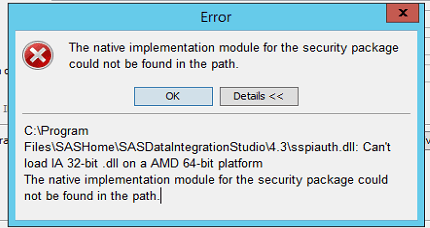Finding MIN (or even MAX) of character variables in SQL
It is perfectly valid to use min() as a summary function on character values in

The native implementation module for the security package could not be found in the path.
Noticed today that our UAT 9.3 environment was failing to execute the SAS ExportPackage Having been blessed with an en-dash (alt + 2013) in our TFS project root, I’ve been having lots of fun getting SAS to ‘play nicely’ with non-ascii characters when running OS commands (eg tf.exe).Reading UTF-8 in Filename Pipe
Storing the values in macro variables wo...
Chaining Windows Commands in SAS Filename Pipe (&)
Using filename pipe (instead of the X command, or
Visual Studio Build Controller does not contain an enabled build agent with name * and no tags.
Currently working on putting our SAS deployment process into TFS and Release Management - part of which involves creating a ‘build’ in Visual Studio.
The below caused a build failure, and didn’t come up in google:
Converting SAS date to Javascript datetime (in Javascript)
Converting a SAS date or datetime to javascript isn’t hard, but still - it should be easy to google for!
var dtSAS=20563;
Thought I’d write this one up as the exact error message didn’t appear on google. Of course, the sharp eyed among you will quickly spot the missing security / authorisation info.. Occasionally when debugging it can be useful to run as a system account for checking permissions etc. This one had me puzzled for a bit (SAS 9.2, Windows 2008, SQLNCLI10.1, OLEDB): Having seemingly brought down our 9.2 Windows 2008 STP server (only in DEV!!) during development of a yet another (awesome) STP web app, it occurred to me that more information was needed about just how many requests were being batted over.Error trying to establish connection: Unable to Initialize: Invalid authorization specification
Running EG or other client tools as SASSRV
A useful utility for this (in windows) is the “runas” command. For instance (from the command window):DIRECT_EXE warning
Event Logging of Stored Process Server Sessions

